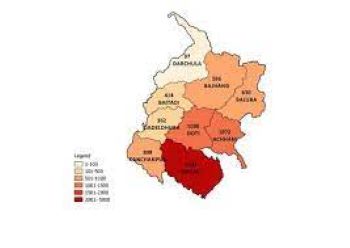

Following increasing COVID-19 risks, cross border mobility of people in Sudurpaschim Province has been regulated.
Those entering Nepal through the transits without the infection tests and facemasks have been barred, said COVID-19 contact person Hemraj Joshi, adding that the measures took place following the detection of the virus in the incoming people from India.
“People entering Nepal from India are found to have contracted the virus. So, we have taken the steps to stem its spread among the community,” he said.
Health desks at transits, Jhulaghat, Pulghat, Jaulagibi, Gaddachauki and Trinagar, have been set up, and tests are ongoing, said the Health Directorate, Sudurpaschim Province. Neighbouring India has recorded increasing COVID-19 cases lately, and its impact maybe imminent in Nepal as well. So, precautions are needed, he said.
According to him, at least 62 people, who entered Nepal from India, are confirmed to have contracted the infection in the past 18 days alone. As a result, the virus risks have increased among the community, he said.
The risks have been more intense at a time when Nepali people, who are in India, are returning home to celebrate Chaite festival and Nepali New Year, he said. It has become mandatory for the people entering Nepal via border points to get COVID-19 tests, and the infected are required to go into home-isolation under the monitoring of the respective local level.
Meanwhile, an Indian national, who was trying to enter Nepal through the Jhulaghat checkpoint, was returned home after he was found infected with COVID-19, said the health office chief Yogesh Prasad Bhatta. The infected man, 58, is from Pithoragarh in India. He was let go back fearing infection risks, he said.
In the meantime, the government has urged people to strictly follow the health protocols and get a booster shot in view of COVID-19 risks. So far in the province, 61,946 people have been infected with the deadly virus out of the total 645,634 tests, according to government data. Six hundred thirty five people lost their lives to the infection.